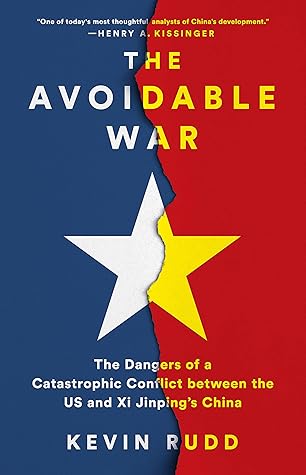More on this book
Community
Kindle Notes & Highlights
by
Kevin Rudd
Read between
April 6 - May 5, 2023
Another group to feel the brunt of Xi Jinping’s increasingly repressive policies has been the legal profession.
However, there is another significant quiver to Xi Jinping’s bow in dealing with political and social unrest around him: his ability to call on the deep reserves of Chinese nationalism to reconsolidate his political position by harnessing populist opinion to his cause. Indeed, nationalism is becoming a core pillar of both the party’s and Xi’s personal political legitimacy and has become a central focus of the party’s vast propaganda apparatus. Nationalism therefore becomes a dangerous additive to the
Chinese nationalism, therefore, looms as a new and potentially dangerous wild card for the wider management of the US-China relationship during the 2020s. Conclusion
But if there is no sustained counterstrategy from the United States over the next several US administrations that effectively rebuilds American power, reenergizes US alliances, and creates a credible global economic alternative to the long-term gravitational pull of the Chinese market, the overall trend lines appear to favor Xi Jinping’s China.
However, of all the moving parts at play in these scenarios, there are four in particular that should be analyzed most closely: three domestic economic factors and one external, where the policy settings lie largely in Chinese rather than American hands. The first remains the long-term sustainability of the emerging Chinese economic growth model, given Xi’s move to the left on Chinese economic policy, and the uncertain effects this will have on private-sector business confidence. The second is the extent to which China’s rapid demographic decline brings about earlier-than-anticipated impacts
...more
This highlight has been truncated due to consecutive passage length restrictions.
For this reason alone, there is an overwhelming case to take all necessary precautionary measures now to significantly reduce the risk of war. That is where managed strategic competition comes in.
Indeed, for America to succeed with an effective national China strategy, it will need sufficient buy-in across both sides of American politics so that the 2020s becomes a decade of rebuilding American power, no matter which party holds political office. This will require unprecedented bipartisan consensus to guarantee strategic continuity across administrations rather than limiting US strategy to something that is truncated every time there is a change in the White House. Once Again: It’s the Economy,
Therefore, any effective national strategy to sustain American national power through the twenty-first century will require repair not just of the fundamentals of US domestic economic strength but also of the social contract. And, once again, that requires time.
The reality is that in this new age of strategic competition between China and the United States, there are, as a matter of logic, only two alternatives: managed competition, with some rules of the road and some prospect of preserving the peace, or unmanaged competition, with the loss of all strategic guardrails and the growing risk of crisis, conflict, or war.


